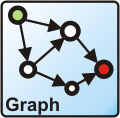-
Notifications
You must be signed in to change notification settings - Fork 199
Home

QuickGraph provides generic directed/undirected graph data structures and algorithms for .NET. QuickGraph comes with algorithms such as depth first search, breath first search, A** search, shortest path, k-shortest path, maximum flow, minimum spanning tree, least common ancestors, etc... QuickGraph supports MSAGL, GLEE, and Graphviz to render the graphs, serialization to GraphML, etc...
-
QuickGraph is a portable library, i.e. supports .Net 4.0, Silverlight 4.0, Windows Phone 7, XBox 360 and Windows 8 Metro apps. QuickGraph is annotated with Code Contracts.
-
Other projects using QuickGraph
PM> Install-Package QuickGraph
This example takes a DataSet, builds the graph of table and constraints from the schema and computes the table topological sort (useful to figure order to populate a database):
DataSet ds = new MyDataSet(); // your dataset
var graph = ds.ToGraph(); // wraps the dataset into a DataSetGraph
foreach(DataTable table in graph.TopologicalSort()) // applies a topological sort to the dataset graph
Console.WriteLine(table.TableName); // in which order should we delete the tables?- QuickGraph 3.6. Portable Class Library support.
- QuickGraph 3.3.51106.0 available on nuget, no more support for .NET 2.0.
- QuickGraph 3.3 (updated) added Code Contracts reference assemblies
- QuickGraph 3.3 adds new graph data structures based on delegates
- QuickGraph 3.2 (bis) supporting Silveright
- QuickGraph 3.2 started using Code Contracts.
- QuickGraph 3.1 brings a Fibonacci Heap and support for 2.0 is back.
- QuickGraph 3.0 takes advantage of extension methods to simplify tasks.
- QuickGraph 2.0 introduced support for generic graph data structures
- The original QuickGraph for .net 1.0 was posted on CodeProject in 8 Dec 2003. It was time to do a refresh and make the graph generic.
The design of QuickGraph is inspired from the Boost Graph Library.